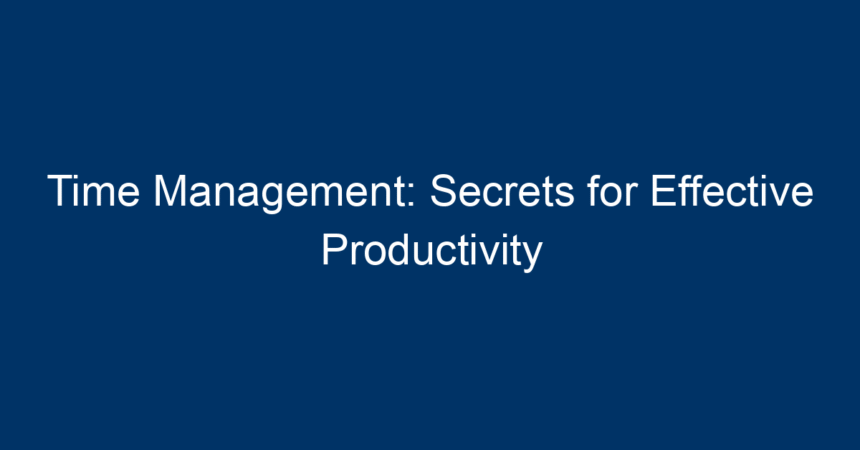In today’s fast-paced world, effective time management is more crucial than ever. The ability to prioritize tasks, meet deadlines, and maintain a work-life balance can significantly influence your productivity and overall happiness. Most of us have experienced the stress of looming deadlines and overflowing to-do lists, but it doesn’t have to be that way. This article explores essential strategies and secrets for mastering time management, ultimately leading you to greater productivity and fulfillment.
Understanding the Importance of Time Management
Before diving into actionable strategies, it’s essential to grasp why effective time management matters.
Boosts Productivity
Properly managing your time allows you to accomplish more in less time. You can focus on what truly matters, leading to enhanced productivity in both your professional and personal life.
Reduces Stress
When you organize your time wisely, you minimize the chaos in your daily routine. This leads to reduced anxiety, allowing you to approach tasks with a clear mind and a positive attitude.
Improves Decision-Making
With efficient time management, you have the space to think critically and make informed decisions rather than rushing through choices under pressure.
The Foundations of Effective Time Management
To improve your time management skills, start with these foundational strategies:
1. Set Clear Goals
Understand what you want to achieve, both in the short-term and long-term. Setting SMART (Specific, Measurable, Achievable, Relevant, Time-bound) goals helps provide direction.
Example: Instead of saying, “I want to get fit,” say, “I will exercise for 30 minutes, five times a week.”
2. Prioritize Tasks
Not all tasks are created equal. Use frameworks like the Eisenhower Matrix to categorize your tasks into four quadrants based on urgency and importance.
Quadrant Breakdown:
- Urgent and Important: Do these first.
- Important but Not Urgent: Schedule these for later.
- Urgent but Not Important: Delegate if possible.
- Neither Urgent nor Important: Consider dropping these tasks.
3. Create a Daily Schedule
Plan your days in advance. Utilize digital tools or paper planners to map out your tasks, allowing for both flexibility and commitment.
Tip: Block time for both work and personal activities. Remember that breaks are as essential as productivity periods.
Advanced Time Management Techniques
Once you’re comfortable with foundational skills, consider integrating these advanced techniques into your routine.
4. The Pomodoro Technique
This method encourages focused work sessions followed by short breaks. Work for 25 minutes, then take a 5-minute break. After four cycles, take a longer break (15–30 minutes). This pattern enhances focus and keeps your mind fresh.
5. Time Blocking
Allocate specific chunks of time for different activities throughout your day. This method fosters discipline and reduces the temptation of distraction, allowing you to commit fully to your scheduled tasks.
6. Eliminate Distractions
Identify what typically disrupts your focus—social media, constant notifications, or even cluttered workspaces—and take proactive measures to limit them. Use apps and tools that block distractions during work periods.
Creating a Productive Environment
Your surroundings greatly impact your time management abilities. A productive environment can significantly enhance your focus and efficiency.
7. Optimize Your Workspace
A tidy, organized workspace invites focus. Invest in ergonomic furniture and minimize clutter.
Tip: Personalize your space with motivational quotes or items that inspire you, but don’t overdo it—limit distractions.
8. Set Boundaries
Communicate your work hours to friends and family. Establishing clear boundaries minimizes interruptions and helps you concentrate during work hours.
Maintaining Work-Life Balance
Effective time management isn’t solely about professional productivity. Balance is critical for overall well-being.
9. Embrace Self-Care
Schedule regular self-care activities to recharge. This can be as simple as reading, yoga, or enjoying a hobby. Remember that a well-rested mind is more productive.
10. Learn to Say No
It’s important to recognize your limits. Taking on too many responsibilities can lead to burnout. Politely decline additional tasks or commitments that don’t align with your goals or well-being.
Leveraging Technology for Better Time Management
In an era of constant connectivity, technology can be a double-edged sword. However, when used wisely, it can vastly improve your time management.
11. Utilize Productivity Apps
Explore productivity tools such as Trello, Asana, or Todoist. These apps help track tasks, deadlines, and even collaborative projects.
12. Automate Repetitive Tasks
Identify tasks that can be automated, whether through software or simple scheduling techniques. Automate appointments or reminders to free up mental space for more critical thinking.
Assessing Your Progress
Regularly reviewing your progress can help you stay aligned with your goals and adjust your strategies as needed.
13. Weekly Reviews
Set aside time each week to reflect on what you accomplished and what you could improve. Evaluate your productivity and make adjustments where necessary.
14. Celebrate Small Wins
Acknowledge and reward yourself for completing tasks—especially the challenging ones. This recognition can boost your motivation and encourage better time management habits.
Conclusion: Take Action Today
Mastering time management doesn’t happen overnight. It requires practice, commitment, and adaptation. Start small by implementing a few strategies outlined in this article and gradually build upon them.
To recap:
- Set clear goals and prioritize your tasks.
- Create a daily schedule to structure your time effectively.
- Apply advanced techniques like the Pomodoro Technique or time blocking.
- Optimize your workspace and utilize technology to enhance productivity.
- Maintain a healthy work-life balance and assess your progress regularly.
By embracing these time management secrets, you can enhance your productivity, reduce stress, and lead a more fulfilling life. Remember, the secret to effective productivity lies not in working harder but in working smarter. Take the first step today!




